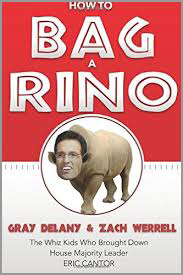This post originally appeared at In These Times.
Last year, the tea party helped change the course of the Republican Party when David Brat, an unknown economics professor, defeated House Majority Leader Eric Cantor in Virginia in the June 10, 2014, Republican primary, despite being outspent 40 to 1. Brat and his supporters (including Ann Coulter, Laura Ingraham and grassroots tea party groups) unnerved the Republican Party by clearly demonstrating that the right wing could challenge any incumbent — and win. Brat’s victory energized the Republican Right, laying the groundwork for the continued harsh stance on immigration reform by Republican presidential candidates, a potential government shutdown over Planned Parenthood funding and the recent resignation of House Speaker John Boehner. Boehner, like Cantor, would have faced a tea party challenger, J.D. Winteregg, in his district’s Republican primary in March 2016.

Waleed Shahid: What is a RINO, and how did you come to hunt them?
I was turned on to politics in high school by Rep. Ron Paul’s (R-TX) 2008 presidential bid. As a hardcore libertarian, I was appalled by the lack of conviction and principle in the Republican establishment. I ultimately found myself on a career path dedicated to pushing these more moderate or outright liberal Republicans out of office.
Shahid: What are the major lessons that you wanted to share in your book?
Werrell: People need to know more about this historic upset than just the headlines. They need to see the inner workings, the struggles, the machinations, so that they too, may, unseat their RINO congressmen! This book is very much a how-to in narrative form. The biggest lesson is that being right is not enough to win. What was the difference between Barry Goldwater and Ronald Reagan? They were philosophically identical, but Reagan had a much better operation and far more activists and organizations to help him.
Shahid: What is the tea party movement to you? How has it been successful?
Werrell: The tea party to me is less a cohesive philosophical bloc and more a general sentiment: “I am fed up with the Republicans, the Democrats, the government in general.” When I first got involved, it was a few random Ron Paul supporters literally throwing tea into bodies of water to make a statement. Its ranks were quickly filled out by more typical conservatives — the grassroots writ large. This sort of passion is useful in political races, because the most passionate are the most willing to work.
Shahid: You talk about putting together a “highly motivated grassroots army” in Virginia. How would you describe your basic on-the-ground strategy to elect Dave Brat and defeat Eric Cantor?
Werrell: One: Go to events where like-minded people might be. Two: Introduce Dave and sign them up as volunteers. Three: Get them to come door-knocking or phone-calling, or to host an event. Rinse and repeat. Given our funding disadvantage, we had to maximize the resource we did have — manpower.
Shahid: During his last years in office, Cantor was disrupted frequently by protesters. What do you think of this tactic?
Werrell: Protesting, in general terms, has never been of interest to me, but a well-organized and populated protest can be a great way to advance a narrative in the media. The Left has been very effective in this and just because the Left uses a technique, it should not be off limits.
Shahid: What are your biggest problems with the American Left?
Werrell: I do not have a problem with the average liberal or leftist. My mother, bless her heart, is very much a liberal, along with my sisters. I do have a problem with the intellectual and political drivers of the Left. I view them as having a deeply un-American ideology, derived not from the Enlightenment and republican thought, but from Karl Marx and Antonio Gramsci. I view culture and civil society as being equally important as government in a republic — yes, we live in a republic, not a democracy. Marx and his intellectual ilk must be stopped. I see them as hostile to cultural institutions, which are the fundamental building blocks of America.
Shahid: How do you see Marx and Gramsci’s influence as being harmful?
Werrell: Marx had a vision of destroying the family, the churches and other cultural foundations to make way for the collective. Gramsci was more of a tactician. He said the way to enact communism was not violent revolution (the way his friends in the Soviet Union were going about it), but rather to destroy a society’s cultural moorings. This manifests itself today in movements such as the one forcing Catholic institutions to provide abortions. I am not a Catholic, but it is ridiculous that a Catholic organization is ordered to provide a service that is clearly not allowed in Catholic teachings. Remember, religious freedom created America, not the other way around.
Shahid: How do you stop “Marx and his intellectual ilk”?
Werrell: A breakdown of strong centralized government would help. I supported Scotland’s right to secede from the UK. The intellectual heirs of the Enlightenment have not come up with a good response to Marx et al., which is why their advance has been so steady for so long. There have been no great philosophers over the past 100 years, unless you include Friedrich Hayek, Ludwig von Mises, etc., who have further developed Enlightenment thought.
Shahid: I’ve seen you quote Saul Alinsky a fair amount. Is he an influence of yours?
Werrell: He is not an intellectual influence of mine. His ideology was rotten to its core. However, he was a brilliant tactician and I will use what works for my ends.
Shahid: “Rotten to its core” in what way? It seems that his organizing theories are the embodiment of local control.
Werrell: Anyone who wants to break down the fundamentals of society — family, culture and community — in order to gain political power is serving a rotten ideology.
Shahid: It seems like the left wing is moving further left and the right wing further right, with the tea party largely responsible for the GOP’s rightward drift. As a tea party sympathizer, what do you think about our polarized politics today?
Werrell: I disagree with the premise. The tea party is not driving this divide, it is an outgrowth — a chicken-and-egg question, if you will. Polarization happens from time to time in any functioning body politic. Sometimes it is slight, sometimes it is dramatic and sometimes it erupts into civil war. I do not think we are at that stage yet, but there is a great deal of tension in our society between the Enlightenment and Marx, between conservatives and liberals. A lot of that can be traced back to the decreasing reliance on localism and family or neighbor relations. This trend is driven, or at least exacerbated, by the rise of constant screen time and social media.
Shahid: What are the biggest challenges and opportunities for the Republican Party in the near- and long-term future?
Werrell: I think the biggest challenge for the Republican Party is ridding itself of the neoconservative war hawks and corrupt cronyists that make up the establishment. The biggest opportunity is embracing the philosophical roots of the party, either classical conservatism, libertarianism or some combination. When voters perceive you as an embodiment of a message, instead of a power-hungry empty suit, they believe you and get energized.
Shahid: What about the tea party — what challenges and opportunities do you see?
Werrell: I think the tea party has been so viciously maligned by the media that its biggest challenge is rebuilding its collective image, which is very hard for a decentralized grassroots movement. The biggest opportunity is harnessing the fact that the federal government is absolutely broken; the American voters are sick of the ruling elites; and there is a very strong anti-establishment movement bubbling up.
Shahid: You were working on a primary campaign challenging Boehner from the right in Ohio. Do you think that played a role in his resignation?
Werrell: We had polling showing Boehner to be in pretty bad shape in his district and I am sure he had similar numbers. I think resigning was the honorable way to avoid being humiliated in Congress or in his home district or both.
Shahid: Where do you hope to see the nation in 20 years?
Werrell: I would like to see a country that has decentralized some power back to the states, that is on a sustainable fiscal path (with a balanced budget and lower overall tax burden), that has renewed economic growth and where individuals have rediscovered the power of local governance, instead of asking their congressman to fix every problem for them.
Shahid: Devolving power back to the states seems like a big priority for you. Many on the Left point to federal decisions that made the country more equitable: the abolition of slavery, Brown v. Board of Education, the Civil Rights Act, Obergefell v. Hodges, etc. Could those large-scale legal changes have happened otherwise?
Werrell: Perhaps in an abstract sense, the federal government acted in an egalitarian way and I think there are people who benefited. But remember, the federal government could just as easily do things you view as reprehensible. There have been equally bad decisions: Dred Scott, etc. The more localized the power, the better in the long run. Concentrated, distant power that is beyond reproach is extremely dangerous. Just because it has not done something harmful yet does not mean it will not.
The federal government has its rules set forth in plain English in the Constitution. Any power not specifically granted to the federal government is a power of the states or the people. The states are the laboratories of democracy.
If Washington state wants to be a socialist haven, let it and if Texas wants to be, well, Texas, then let it be Texas. Do not try to take over the federal government and force your views upon the nation as a whole. It is toxic and dangerous. Let the people, their local officials and their state officials make these decisions. They are infinitely better at responding to the needs of their constituents than are the plutocrats in Washington and five lawyers in black robes.



